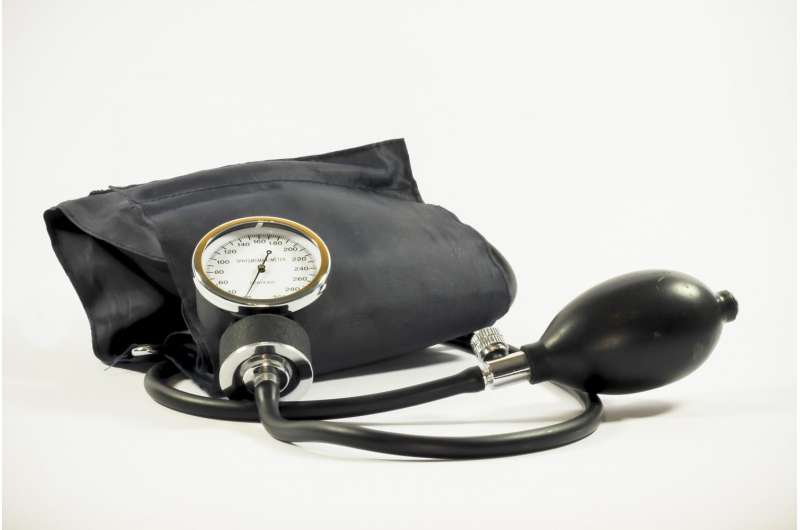Long-term exposure to air pollution linked to high blood pressure

Long-term exposure to air pollution is linked to a greater incidence of high blood pressure, according to the largest study to investigate the effects of both air pollution and traffic noise by following over 41,000 people in five different countries for five to nine years.
The study, which is published today (Tuesday) in the European Heart Journal, found that among adults, up to one extra person per 100 people of the same age group living in the most polluted areas of cities would develop high blood pressure (hypertension) compared to those living in the less polluted areas. This risk is similar to the effect of being overweight with a body mass index (BMI) between 25-30 compared to people with normal weight (BMI 18.5-25). High blood pressure is the most important risk factor for premature illness and death.
This study is one of the first to investigate both air pollution and traffic noise simultaneously and it found that traffic noise is associated with an increase in cases of hypertension as well. The way the study was conducted enabled the researchers to estimate the risk that was linked to air pollution and the risk linked to noise separately. The association of air pollution with hypertension remained even when exposure to traffic noise was considered in the analysis. The researchers say this is an important finding because there are differing ways of reducing air pollution and noise.
A total of 41,072 people living in Norway, Sweden, Denmark, Germany and Spain participated in the study, which was part of the "European Study of Cohorts for Air Pollution Effects" (ESCAPE) project that is investigating long-term effects of exposure to air pollution on human health in Europe. Information on blood pressure was gathered when the participants joined the study and during a follow-up examination in later years. None had hypertension when they joined the study, but during the follow-up period 6,207 people (15%) reported that they developed hypertension or started to take blood pressure-lowering medications.
Between 2008 and 2011, the researchers measured air pollution during three separate two-week periods (to allow for seasonal effects). They used filters to capture information on concentrations of polluting particles known as "particulate matter" (PM) of different sizes: PM10 (particles less than or equal to 10 microns in diameter), PM2.5 (less than or equal to 2.5 microns), PMcoarse (PM10 minus PM2.5) and PM2.5 absorbance (a measurement of soot particles). These measurements were taken at 20 sites in each of the areas being studied, and measurements of nitrogen oxides were measured at 40 different sites in each area. Traffic density was assessed outside the homes of the participants and traffic noise was modelled according to the EU Directive on environmental noise.
The researchers found that for every five micrograms per cubic metre (5 μg/m3) of PM2.5, the risk of hypertension increased by a fifth (22%) in people living in the most polluted areas compared to those in the least polluted areas. Higher soot concentrations also increased the risk.
For exposure to chronic traffic noise, the researchers found that people living in noisy streets, where there were average night time noise levels of 50 decibels, had a six percent increased risk of developing hypertension compared to those living on quieter streets where average noise levels were 40 decibels during the night.
Professor Barbara Hoffmann, Professor of Environmental Epidemiology at the Centre for Health and Society at Heinrich-Heine-University of Düsseldorf, Germany, who led the analysis, said: "Our findings show that long-term exposure to particulate air pollution is associated with a higher incidence of self-reported hypertension and with intake of anti-hypertensive medication. As virtually everybody is exposed to air pollution for all of their lives, this leads to a high number of hypertension cases, posing a great burden on the individual and on society.
"Exposure to traffic noise shares many of the same sources with air pollution and so has the potential to confound the estimates of the adverse effects of pollution on human health. However, this study controlled for traffic noise exposure and found that the associations of air pollution with hypertension did not vanish. This is important because preventive measures for air pollution and noise differ.
"One very important aspect is that these associations can be seen in people living well below current European air pollution standards. This means, the current legislation does not protect the European population adequately from adverse effects of air pollution. Given the ubiquitous presence of air pollution and the importance of hypertension as the most important risk factor for cardiovascular disease, these results have important public health consequences and call for more stringent air quality regulations."
The study found there were higher average levels of pollution in the central and southern European study areas - Germany and Spain - than in the Scandinavian areas - Norway, Sweden and Denmark. Exposure to traffic noise and traffic load was highest in the study areas of Sweden and Spain.
The researchers say that it is possible that air pollution and noise affect different, or not completely overlapping, pathways involved in disturbances in the way the body normally functions. Possible biological mechanisms for the adverse effect of air pollution on the functioning of the heart and blood vessels include local and systemic inflammation, oxidative stress (a build-up of damaging molecules in the body), and an imbalance in correct functioning of the nervous system. Noise is thought to affect the functioning of both the nervous and hormonal systems.
More information: "Long-term exposure to ambient air pollution and traffic noise and incident hypertension in seven cohorts of the European study of cohorts for air pollution effects (ESCAPE)", by Kateryna B. Fuks et al. European Heart Journal, DOI: 10.1093/eurheartj/ehw413


















